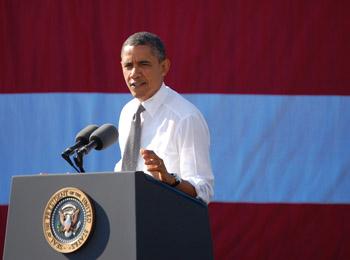Does the President Really Matter?
By • May 3, 2012 0 1483

From now until November, all of us will be bombarded in print and on the airwaves with political campaign ads, polling numbers, social media advocacy, vitriol and validation. All focused on the election of one individual to a single office, the President of the United States.
But in the grand scheme of things, as you watch these campaign commercials, ask yourself this simple question: Does the president really matter?
Think about it for just a second.
There are those who are reasonably certain that the president they elect will be their personal salvation — rendering their household bills suddenly affordable, putting cheap gas in the tanks of their SUVs, reducing crime in their neighborhoods and taking them off the unemployment rolls.
The perception of the president as having absolute power over one’s life is nothing new. But it is a naive and polarizing view.
In the 1840s, Scottish writer Thomas Carlyle wrote that “the history of the world is but the biography of great men.” Writing about men like Muhammad, Luther and Napoleon, Carlyle theorized that heroic men shape history through both their personal attributes and via divine inspiration — that all great events turned on the great decisions of great men.
If the entire country defines the chief executive’s span of responsibility, can a president be held accountable for everything that the nation does or fails to do?
Credit or blame, in their cumulative form, generally define a presidency. Both are spun wildly by pundits in countless venues with countless agendas. But the reality is that a president actually has far less influence on our daily lives than we may give him credit. The president is routinely described as the most powerful person in the world. It is, after all, the president who creates budgets, develops domestic policy, energy policy and conducts foreign policy. The president nominates Supreme Court and Federal judges. He sets legislative agendas and has veto power over congressionally passed bills.
But they never do so in a vacuum. There are countless countervailing, equalizing forces that face every presidential decision — from sending troops into a war zone to submitting a budget resolution. He must face congressional opposition, media scrutiny, lobbyists, foreign leaders and Supreme Court decisions.
We routinely elect our presidents under the promise of “change.” But presidents are seldom the sole catalysts for change. They get plenty of help along the way. They can help set the conditions for progress, but they rarely directly cause it to occur. If a president goes too far with a policy, opposition sets in, and the intended action is voted down or modified in some way. In the longer term, if he goes way too far or doesn’t do enough, he’s not re-elected. The president submits a budget for the nation, but Congress must pass it. When Congress passes a budget resolution, even when he opposes it, the president has no choice but to spend the money.
What was the last presidential decision that affected you? Most of us will be hard-pressed to think of even one.
Certainly, for our servicemen and women and their families, the question will be readily answered with whatever theater of war to which they or their loved ones have deployed. For those who have been injured or killed, the loss of life or limb cannot be reversed or changed. And so, for the 1 percent of our nation who serve, the president and the decisions he makes as commander-in-chief, matter a great deal.
For everyone else, whoever is president affects our lives to a far lesser extent than we may believe. We may agree or disagree with a president’s policies, but precious few of those policies represent original thought. Chances are, for each policy cited, other presidents before them have espoused something very similar. Agendas may matter far more than the president himself.
So, here’s a quick drill for you. Answer this quickly: Who are the truly great presidents?
Maybe you answered with names like Washington, Lincoln, Jefferson, FDR. Those Americans born before 1963 may point to President John F. Kennedy, based on the decisions he made during the Cuban Missile Crisis, that played a principal role in averting a global nuclear war. Whomever you picked, chances are, those presidents likely did indeed do great things — created the conditions for our democracy, preserved the Union, averted nuclear war, etc. But whoever were your top picks, it’s likely that your list represents only a fraction of the 44 U. S. presidents.
That’s why leadership matters, above all else.
As politics becomes more and more polarizing, and as Americans are moved further and further to extremes, there will be many who attempt to attach the “Great Man” theory to the Office of the President.
But don’t fall for it. For even a second.

